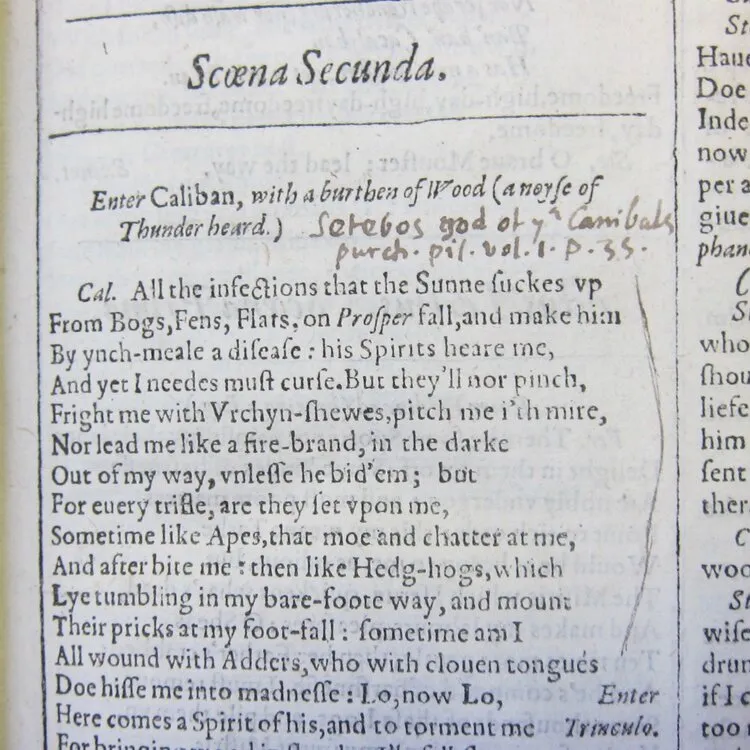Is This John Milton’s Annotated Copy of Shakespeare’s First Folio?
A copy of the Bard’s collected plays may contain notes penned by the ‘Paradise Lost’ author
/https://tf-cmsv2-smithsonianmag-media.s3.amazonaws.com/filer/c8/85/c8853631-ca82-488a-97e1-72e6e9f4affb/songmeasureflpfolio.jpg)
A rare edition of Shakespeare’s First Folio may boast a previously unheralded connection to Paradise Lost poet John Milton.
As Alison Flood reports for the Guardian, new research conducted by Cambridge University’s Jason Scott-Warren suggests Milton, the Bard’s near-contemporary and a literary luminary in his own right, penned annotations found in a copy of the 1623 collection. This text, donated to the Free Library of Philadelphia in 1944, represents the first published collection of Shakespeare’s plays and is one of around 230 folios known to survive today.
Scott-Warren, director of the Cambridge Centre for Material Texts, proposed the new attribution after reading an article on the folio and noticing that notes scribbled by the anonymous annotator bore a striking resemblance to Milton’s handwriting.
“I always think ‘I recognize that handwriting,’” he tells Flood. “I go and check and normally I’m wrong. This time I thought: ‘The case is getting stronger and stronger.’”
The Cambridge scholar initially floated his theory in a blog post published earlier this month, writing, “If this book is what I think it is, it’s quite a big deal.” Although the evidence cited was “strictly palaeographical,” or based on similarities between the folio owner’s and Milton’s penmanship, academics from around the world have since reaffirmed Scott-Warren’s assessment, pointing out parallels beyond handwriting and lending additional credence to the claim.

Claire M.L. Bourne, a Pennsylvania State University professor who wrote the article that inspired Scott-Warren’s discovery, spent 10 years studying the folio. As she explains to the Washington Post’s Hannah Natanson, the commentator’s “very precise, granular engagement with the text”—including such proposed edits as “wicked tongue” rather than “idle tongue” and “past hope, past cure, past help” instead of “past hope, past care, past help”—“really excited me.”
Although Bourne recorded an array of insights on the annotations, including potential dates for their creation and the unusual approach adopted by their maker, she was never able to identify the folio reader. “Sometimes it just takes differently trained eyes to see a connection,” Bourne writes in a blog post, “and this week, Jason Scott-Warren did just that.”
Per the Post’s Natanson, the marginalia ranges from line edits to flagged passages, revised examples of iambic pentameter, and even newly proposed titles: Rather than Romeo and Juliet, for example, the reader suggests Juliet and Romeo. Despite the extensive nature of the annotations, Scott-Warren tells Natanson he doesn’t think Milton was attempting to prove his superiority over Shakespeare. Instead, he says, Milton likely strove to correct errors introduced by the printer and build on the “immense potential of the texts.”
“Milton is a real admirer of Shakespeare,” Scott-Warren adds. “He thinks Shakespeare is a brilliant writer, and he wants the text to be as brilliant as it can be.”
In recognition of the newly raised attribution, the Free Library of Philadelphia has opted to place its copy of the First Folio on view through October 19. While it will likely prove impossible to definitively identify the markings as Milton’s hand, Aaron Pratt, curator of early books and manuscripts at the University of Texas at Austin, tells the Post that a painstaking pairing of each annotation with a known example of the Paradise Lost poet’s writing must be conducted to even come close to “smoking gun-level proof.” (Bourne and Scott-Warren say they are currently working on a paper aimed at highlighting such connections.)
“It’s incredibly exciting and rare for scholars to have any new document that can give us a glimpse into the way an early writer wrote,” Pratt says. “Immensely more exciting, needless to say, if the document shows one of England’s most famous writers in conversation with the most famous one.”
/https://tf-cmsv2-smithsonianmag-media.s3.amazonaws.com/accounts/headshot/mellon.png)
/https://tf-cmsv2-smithsonianmag-media.s3.amazonaws.com/accounts/headshot/mellon.png)